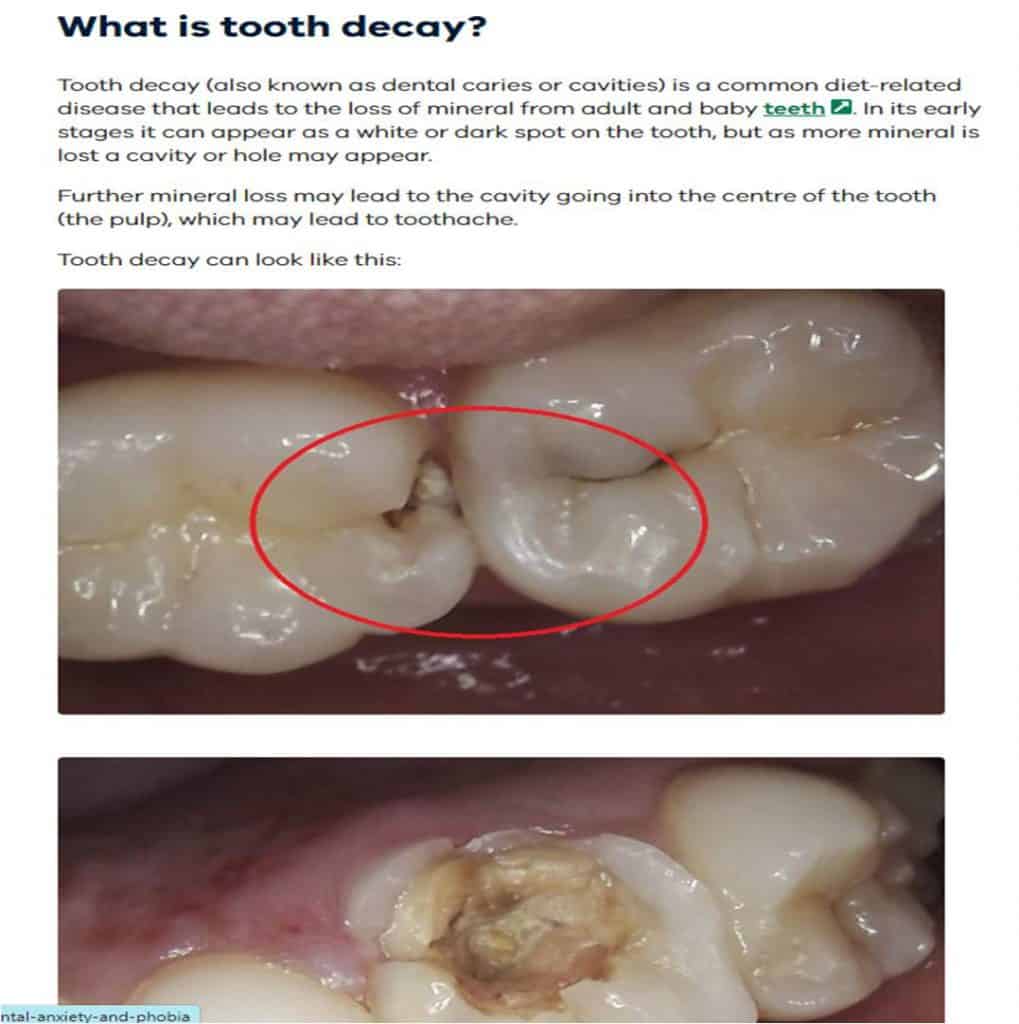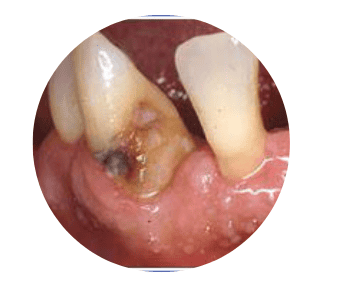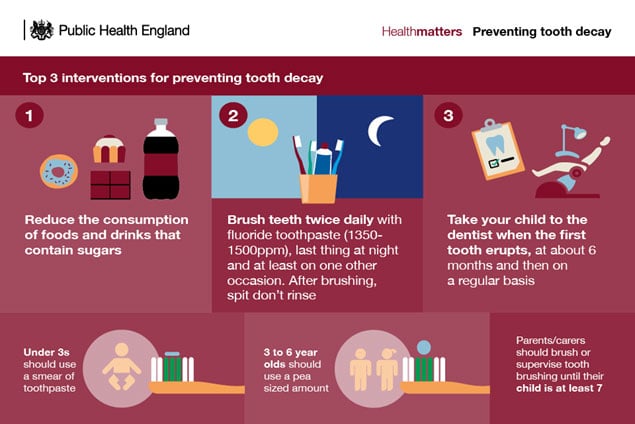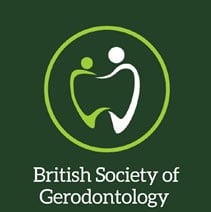Tooth decay is one of the most common chronic diseases world wide. Tooth decay (dental caries) is caused by sugars in the diet being broken down by bacteria in the plaque biofilm found in the mouth. These bacteria produce acids that dissolve (demineralise) the hard tooth surfaces – enamel and dentine. In the early stages tooth decay can be reversed. The tooth can be hardened (remineralised) after an acid attack by minerals (calcium phosphate in saliva) and fluoride.
Tooth decay is largely preventable
We often think of cavities and tooth decay as a childhood disease but tooth decay (dental caries) can affect anyone at any age – if the conditions in the mouth are right. Many more people are entering old age with at least some natural teeth. New decay can affect these teeth, especially on exposed root surfaces. When gums recede the softer root surface (dentine) is exposed and can decay more rapidly than the enamel covering the crown of the tooth. If you have had a lot of tooth decay (needed a lot of fillings) in the past you are more likely to be at risk of root decay. Root decay is more likely if you suffer from dry mouth (xerostomia), struggle to keep teeth clean (poor plaque biofilm control) and have root surfaces exposed (recession).
People more likely to develop tooth decay –
Children who have been admitted to hospital to have teeth removed.
Anyone who has tooth decay
Anyone with a disability, are medically compromised and older adults who are physically or mentally frail.
Preventing tooth decay involves reducing things that cause demineralisation e.g. sugars, and increasing those things that favour remineralisation e.g. saliva flow, fluoride. The amount of tooth decay we experience is largely down to managing these factors and having a healthy balance between demineralisation and remineralisation. These factors vary at different stages throughout life. Regular dental attendance to assess your risk and monitor changes to the teeth is important. The the dental team will be able to pick up early signs of decay before a cavity develops. Prevention really is better than cure!


Root decay is a cavity which develops on the root surface of the tooth. The root surface is much softer than the enamel covering the crown of the tooth so it can decay more rapidly.
It is more common in older people where receeding gums expose the root surface at the neck of the tooth. The decay may extend under the gum line.
Risk factors for root decay are frequent sugars in food and drink, poor oral hygiene and poor saliva flow (dry mouth).
Factors that affect your risk of tooth decay (cavities)
The frequency and amount of sugars eaten/drunk. The more often sugar is in the mouth and the longer sugar is in contact with tooth surfaces the more likely a cavity will develop. Aim to keep sugar containing food and drink to mealtimes only and avoid anything with sugar before bedtime. Anyone with chronic health problems may be at extra risk due to the frequent need to take sugar based medicines or supplements. If you are struggling with sugary food/drinks, snacking or mealtime nightmares we recommend you visit Growing Healthy Eaters where Dr Colette Reynolds has some great advice for parents struggling to get their children to eat a healthy diet. Colette joined oral health coach LeighGS recently for Talking Teeth Thursday live on Facebook. You can view the recording of this session here.
The amount and quality of saliva and its ability to remineralise/harden tooth surfaces. Dry mouth (xerostomia) can have a major impact on cavities developing and may be related to disease or/and medication. Chewing sugar free gum can stimulate saliva flow.
Fluoride
Fluoride containing toothpastes introduced in the early 1970’s have played a major role in reducing childhood tooth decay in the UK. Fluoride hardens tooth surfaces and helps protect the teeth and root surfaces from tooth decay and acid erosion. Toothpaste is the most common way of fluoride helping to protect teeth. Find out which toothpaste is best for your here. Not sure about your risk of developing tooth decay? Take Time Out For Teeth to get some help to determine your current risk of cavities.
Fluoride can be found in all water supplies naturally but often not at a level which will protect teeth from tooth decay and acid erosion. Some water supplies in the UK and around the world do contain fluoride at the ‘optimal level’ to prevent tooth decay – one part (fluoride) per million (parts of water). Learn more about water fluoridation in the UK on the British Society of Fluoridation’s website.
Dental Visits
Visiting your dentist and their team regularly will help ensure you have a healthy, functional and attractive smile for life.


Guide for parents of children with autism
Both can be found here at the British Society of Paediatric Dentistry.



The amount and frequency of sugar intake is a major risk for cavities. Find out more about sugar here
Poor saliva flow (a common side effect of medications), increases the risk of tooth decay. Find out more about dry mouth here



